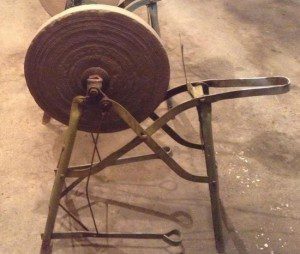
For those of a certain age, the sound of this bell is unique. It’s distinct from a church bell, a bicycle bell, a carillon bell, and even a fire engine bell. As close as I can put into words, it goes, “Ca-clang, ca-clang,” in a slow, swinging, walking-like rhythm. And it has a very specific translation for those of us who remember it.
“I’m nearby, on your block,” it says. “I’m here for one thing. So, come to the curb if you need your knives, scissors or garden tools sharpened.”
The weekend before last, our daughter had left her eldest with me. Once my granddaughter had consumed the number of donuts allowed by her mother, and after we had enjoyed some playtime in the backyard, I suggested I needed to get some writing done upstairs in my office. She asked if she could work at a desk too.
By the time she was hard at work – colouring an image for a collection of pictures in her binder – that’s when I happened to open my office window and noticed it. Off in the distance, I could hear the steady “Ca-clang, ca-clang” of that bell. I might have ignored it, except for the fact my granddaughter noticed it too.
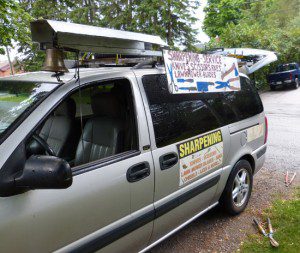
“Is this ever a teaching moment,” I thought, and, as I dashed downstairs, out the front door and into the street toward the bell ringing in the distance, I told my granddaughter, “Stay there. I’ll be right back.”
A few minutes later, I’d caught up with John Zentana, who was making that distinctive, rhythmic and ringing sound via a bell hanging just outside the driver’s side window of his well-travelled Chevy Venture van. Painted on a couple of signs adorning the van were two-dimensional images of knives, scissors, axes, meat cleavers and hedge clippers.
I indicated I wanted a couple of clippers sharpened, but asked him if he’d do the work back in my driveway several blocks away. John motioned me into his passenger seat and back we went. My granddaughter was obediently waiting for my return and a bit surprised when I jumped out of a stranger’s van.
“I’ve got a little adventure for us,” I explained and I introduced her to Mr. Zentana, who smiled, I guess realizing this was not only enterprize, but also education.
The sharpening man my dad probably showed me when I was a kid, didn’t drive a van. He walked the streets of Agincourt (where I grew up in the late 1950s) with that schoolyard-type bell in one hand and the handle of his sharpening rig in the other. When we stopped him for his service, he’d anchor his cart to something solid, sit in a seat straddling the rig and rotate the sharpening stone with the steady stroke of a foot peddle below. His human-powered grinding stone rotated in front of him as he set to work sharpening our family’s gardening tools.
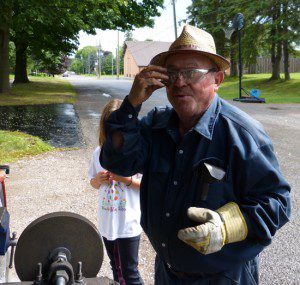
Progress had intervened since then, and John Zentana’s grinding stones rotated courtesy of a fan belt attached to the motor of his van. But before he dealt with my tools, John made sure he’d put gloves and goggles on. Safety first, he said. (He’d obviously done this demonstration for some of his own offspring and knew equally well it was a valuable teaching moment.)
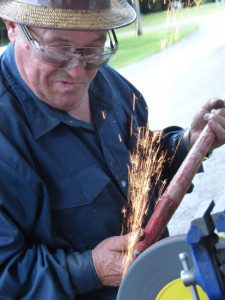
I stood with my granddaughter gently pointing out each aspect of Mr. Zentana’s skills: short, gliding strokes of the garden-tool blade with just the right amount of pressure against the sharpening stone. She nodded in understanding, but I think she was most engrossed by the sparks that flew “like fireworks,” she said.
To me his work, like the clanging of his bell, represented a rhythm in manual labour we seldom see anymore, the rhythm of well-practised hands moving precisely, smoothly through a process with a start and a finish, all guided by years of experience. Zentana had come from Italy in the 1960s, I think. He said he’d earned a living like so many from his homeland in the booming construction business, laying bricks, framing lumber and dry-walling house interiors.
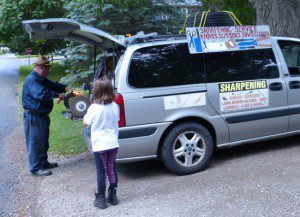
But I guess he felt most at home sharpening tools, both to augment his income and perhaps because he liked the closer contact with customers. He knew then – he knew this day with my granddaughter – the true meaning of providing a service.
All too quickly for my liking, the sharpening man was finished. Just to prove to me (and maybe to himself) the job was done right, he crouched down on my front lawn and tested the clippers he’d sharpened. They sheared through those blades of grass like a scalpel through tissue paper.
“You’ll probably never see this again,” I suggested to my granddaughter. In fact, with John Zentana’s trips from the city to our community limited to perhaps a couple of visits a year, I wondered whether I’d ever see it again. But I know I’ll never forget the sound of his bell.